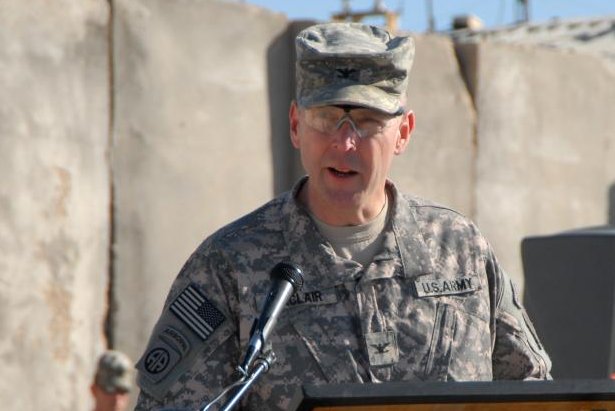U.S. Army Brig. Gen. Jeffrey Sinclair, here a colonel, in Iraq in 2008. (ARCENT/James Wagner)
FORT BRAGG, N.C., March 10 (UPI) -- Emails turned over by the prosecution in the sexual assault case against Brig. Gen. Jeffrey Sinclair raised questions that the Pentagon may have interfered with a possible plea bargain.
Col. James L. Pohl, the judge, dismissed the jury for the day Monday to consider new evidence that senior officials at Fort Bragg, N.C., discussed fears Sinclair's primary accuser may have falsely testified. The defense team accuses the Pentagon of unlawfully interfering to prohibit the offer of a plea deal as it faces increased pressure to clamp down on a sexual assault crisis in the military.
The lead prosecutor, Lt. Col. William Helixon, resigned from the case after he was unable to persuade his superiors to dismiss the most serious charges against Sinclair. Emails revealed over the weekend showed the Army's most senior lawyer at Fort Bragg had also expressed concerns about the accuser's testimony.
“It is possible that she was not truthful,” Col. Michael Lacey, the senior military lawyer at Fort Bragg’s XVIII Airborne Corps, wrote to the Corps commanding officer, Lt. Gen. Joseph Anderson, following the accuser's January 7 testimony about finding an old iPhone that contained messages between herself and Sinclair. Forensic analysis was shown to conflict with her testimony.
Sinclair, 51, is accused of forcing a captain to perform oral sex and threatened to kill her and her family if she revealed their affair. The accuser, 34, confirmed she had previously engaged in a consensual relationship with Sinclair.
Sinclair also faces charges of adultery, which is a crime under military law, and conduct unbecoming an officer. He has offered to plead guilty to those lesser charges and retire at a reduced rank if the military agreed to drop the sexual assault charges.
The judge has previously rejected several motions from the defense to dismiss the sexual assault charges.
[New York Times]















